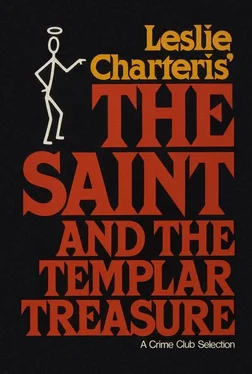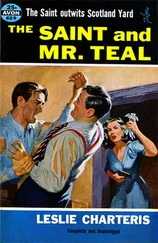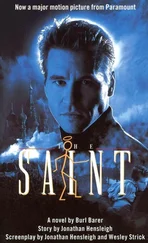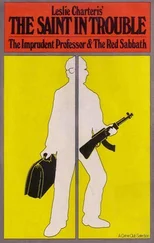He swung the wheel, deducting one of the animal’s nine lives, and pulled on the handbrake. The lever rose with sickening ease and the car continued to hurtle on.
The Saint crashed down through the gears with a violence that had the engine screaming in protest, but the braking result was then too late for any possibility of taking the sharp curve that loomed suddenly ahead, with a tidily spaced border of shade trees ruling out any chance of shunting on to soft shoulder.
In a matter of microseconds, his brain worked out equations of distance, speed, and centrifugal force. Like a galvanized jack-in-the-box, he jumped from his seat on to the door, braced a foot against the windshield pillar, and launched himself out and backwards, giving the maximum neutralization to his inherent momentum. If he got it right, he should be able to hit a gap between the tree trunks.
He landed with legs flexing to take the first shock, and rolled like a parachutist. His left arm and shoulder curled into the impact, and the reflex action that relaxed the rest of his body saved him from injury as he somersaulted across the verge and cannoned into the base of the hedge beyond. As he finally came to rest, he heard the sickening crunch of tortured metal and shattering glass which told him that the car too had finished its journey.
He lay still for a moment while he regained his breath, and then climbed to his feet and walked towards the wreck.
The Mercedes lay upside down beside the road. His final spin of the wheel had caused it to skid off the bend, and it had hit a tree broadside, rebounded, and overturned. One rear wheel was still forlornly turning as he reached it.
The offside wing had been all but ripped away, and the rest of that coachwork stove in. The headlights, front fender, and most of the other external attachments had been torn off. The Saint snaked a hand under the dashboard and killed the engine. The air was heavy with the stench of petrol, and he was surprised that the tank had not exploded on impact. The steering column was embedded in the back of the driver’s seat, and he did not care to dwell on what his fate would have been if he had stayed there.
He breathed silent thanks to the impetuous feline whose sudden appearance had saved him. If he had not been forced to brake so sharply when he did, he would have drifted into the corner at full speed and by then it would have been of purely academic interest. He thought back over the drive and realised that it was only because of the negligible traffic that the braking systems had not been put under pressure before.
One brake failure may be an accident; two brakes failing simultaneously is almost certainly attempted murder. Simon did not bother to investigate the wreckage to prove his hypothesis but scanned the surrounding terrain for signs of a telephone or transport.
His predicament was so obvious that the first truck that came along stopped at once. Fortunately the driver’s home base was Carpentras, and he sympathetically took the Saint all the way to the garage he had set out to look for.
The Hirondel stood in a bay next to the entrance, where passers-by could not fail to notice it, as proof of the establishment’s quality of clientele. The paintwork had been waxed until it blazed, and the light sparkled along the recently polished chrome trimmings. It shamed the production-line boxes around it like a peacock amid a flock of barnyard hens. He glanced inside at the dashboard but bore no grudge when the tripmeter showed that it had already been given a lengthy and unauthorised road test.
He was starting to open the front to check the radiator when a voice behind him suggested forcefully that he should desist and depart. The words chosen to convey the message have no place in a narrative that may be read by minors, maiden aunts, or deacons of the Faith. The Saint turned, and the unfriendly expression on the mechanic’s grease-smeared countenance turned to one of welcome and contrition. He offered a thousand apologies for not having recognised the Saint, and Simon accepted one.
“Is she ready?” he asked.
The mechanic beamed.
“What a beautiful car!”
Simon smiled tolerantly.
“Yes, I know, but is she ready?”
The mechanic admitted that she was, and went on to explain how in addition to replacing the radiator he had tuned the carburettor, balanced the wheels, repaired a small hole in the silencer of which the Saint was unaware, and given the entire vehicle a complete lubrication.
“Now I have another job for you,” said the Saint, when the garagiste had finished the account of his labours.
He recited the essentials of his accident and gave its location.
“Bring it in as soon as you can and see if it’s good for anything but the scrap-heap. I’ll be back for the bad news after lunch.”
He asked directions for the post office, which had always been his second destination. It was near the centre of the old town, facing the Palais de Justice across the pleasant open square in front of the five-hundred-year-old cathedral of St.-Siffrein. He wrote the Paris phone number he wanted on a slip of paper and handed it in at the counter. It was, he reflected, a roundabout way to make a simple telephone call, but the chances of being overheard at the château had left him no choice, and it was actually the main reason for his trip to Carpentras.
He had absorbed most of the information on the official notices that lined the walls by the time the clerk announced that his call was ready and he went into one of the booths to take it. He heard the operator check the number, and then the gentle voice that brought the memories of a darker and more violent era flooding back.
“Do you still stock the works of Francois Villon?” the Saint inquired, and smiled to himself as he pictured Antoine Louvois in his small bookshop near the Odéon reacting to that simple question.
He could see the tall greying figure, the keen alert eyes, and the slender hands that held the receiver. And he remembered another day when those same artistic hands had grasped the plunger of a detonator and sent a score of Nazis instantly into the heaven of the Herrenvolk.
There was an appreciable pause before the answer he was expecting crackled along the line.
“We do not have much demand for those old works today.”
“Mais où sont les nelges d’antan?” sighed the Saint.
There was another pause before the other requested him to repeat his words.
“But where are the snows of yesteryear?” Simon quoted again, and laughed softly. “Do you forget so easily?”
“Simon! Where are you?”
“In Provence, in Carpentras, and it would take too long to explain why, but I’m going to bother you again.”
“It is so good to hear from you. You are coming to Paris?”
“Not right now, Antoine. But I need some information and you may be able to help me.”
“Tu n’as qu’à demander, cher ami.”
“I want you to think back to the war, to the Occupation. Does the name Florian mean anything to you? Philippe Florian?”
Again there was a pause and the Saint added: “Dark, stockily built, about forty-five. Apparently had links with the black market in Paris.”
Louvois chuckled.
“Ah, you mean Le Caméléon.”
The sobriquet seemed particularly inappropriate. Somehow the Saint could not imagine the portly figure of Philippe Florian merging into any background, but he remembered that members of the Resistance had used many strange nicknames to protect themselves. Louvois himself had been known as Colonel Eglantine.
“Alors?” Simon prompted.
“A brave and useful man,” said Louvois seriously. “He was big in the black market, it is true, but that was a good cover. The Germans thought he was a collaborator, so they tolerated his activities, but the information he gained he passed on to the Resistance. His connections helped us in many ways.”
Читать дальше












